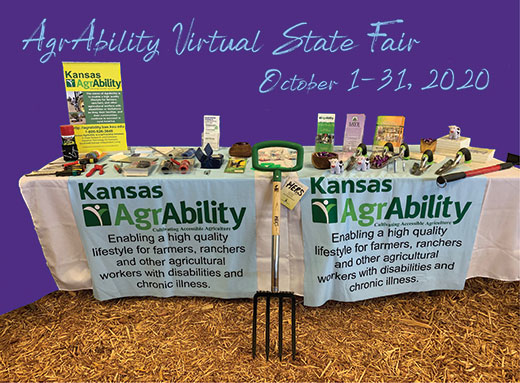
Kansas AgrAbility is part of a 19-state effort in October to broaden its reach of services to farm workers with a disability, functional limitation or health condition. | Download this photo.
Program that aids disabled farm workers plans ‘Virtual State Fair’
Kansas AgrAbility joins 19-state effort during October
Sept. 23, 2020
MANHATTAN, Kan. – A program that provides information and help to farmers, ranchers and other farm workers with disabilities or other limitations is about to launch a month-long effort to spread education in 19 states.
Organizers announced that the Agrability Virtual State Fair will run through the month of October to highlight its support for the agriculture industry. The Kansas AgrAbility project will be featured on Oct. 22.
AgrAbility is funded through the U.S. Department of Agriculture’s National Institute of Food and Agriculture. The program was first authorized in the 1990 Farm Bill. Its primary purpose is to provide services and information to help farmers, ranchers and farm workers who are affected by a disability, functional limitation or health condition.
Some of the more common disabilities or health conditions reported among Kansas farmers include arthritis, spinal cord injury, amputation, traumatic brain injury, stroke, diabetes, visual or hearing loss, respiratory problems and back impairment or joint injuries.
Paul Jones, project manager for the national AgrAbility project, said the idea for the AgrAbility Virtual State Fair grew from the fact that one of the primary ways to reach the agricultural community – through county and state fairs – was cancelled this summer and fall.
“A conversation started this summer in which we asked: ‘What if we held an AgrAbility State Fair as a way to reach people who may be living and working with a disability in agriculture?’” Jones said.
“We can tell them that we are here to support them and we want to see them succeed.”
Many services provided by AgrAbility are free. The Kansas AgrAbility program can help provide:
- On-site farm assessments to identify barriers and challenges.
- Recommendations for safe and appropriate assistive technologies, such as equipment, devices or efficient modified work practices.
- Referrals on agriculture, safety, and disabilities.
- Educational training opportunities.
- Referrals to outside agencies for assistance, such as funding resources or occupational and physical therapy assessments.
- Peer support to connect farmers with each other.
The Agrability Virtual State Fair coincides with the National Disability Employment Awareness Month, which is in its 75th year. Also, October marks the 30th anniversary of the Americans with Disabilities Act.
“Those of us that work for AgrAbility projects have the experience of seeing the impact that a person with a disability can make in their workplace,” Jones said. “The farmers, ranchers and workers we’ve met have a will and a heart like no other.”
Learn more about Kansas AgrAbility online. Also, interested persons can follow the AgraAbility Virtual State Fair on Facebook and Twitter.

